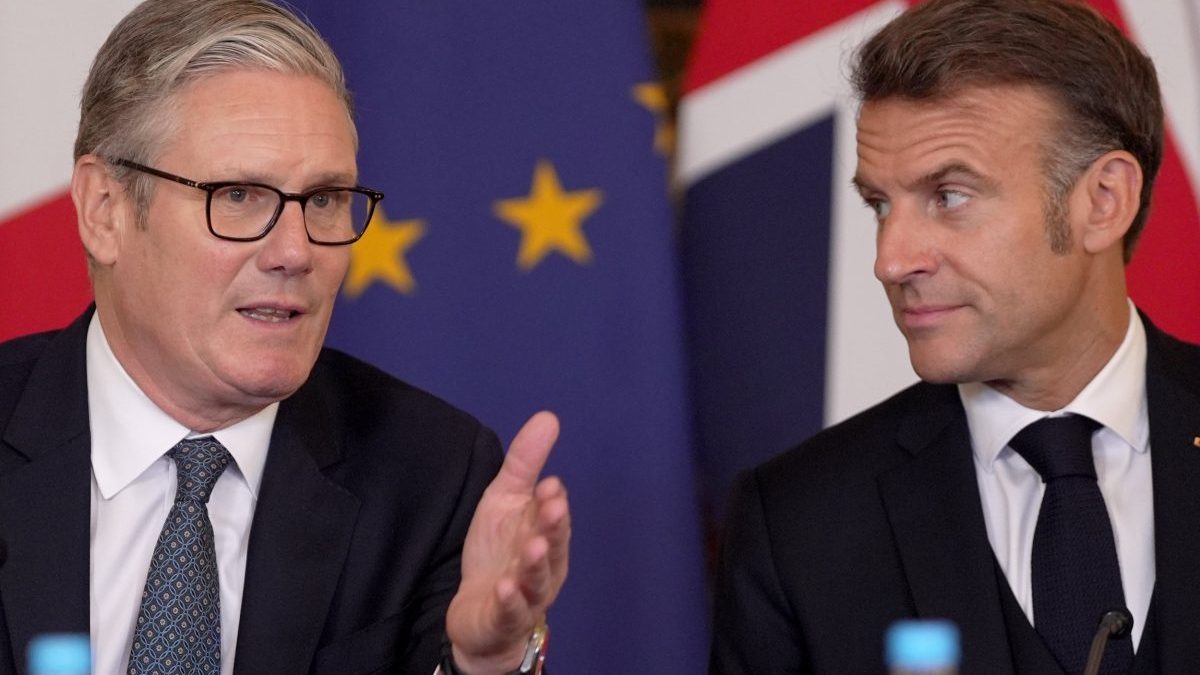Thousands of migrant will need to be deported for scheme to work, Prime Minister warned
The Government’s Brexit reset has paved the way for the EU to approve Sir Keir Starmer’s new migration deal with France which is designed to stem Channel crossings, No 10 believes.
Starmer agreed a new one-in-one-out deal with the French president Emmanuel Macron on Thursday in a bid to to return migrants who cross the Channel which he said would begin within weeks.
But the deal will still need rubber stamping by the European Union, with some countries, such as Spain and Italy, said to be opposed to it over fears they would have to take more migrants.
Critics have also suggested the deal could be held up by court challenges in the same way the Tory’s Rwanda plan was delayed for two years – and eventually scrapped by the new Labour administration.
No 10 however insisted that the agreement with the French was robust enough to clear any legal hurdles – and that the Brexit reset deal signed in May means the EU has already effectively agreed to the plan, The i Paper understands.
The returns deal will allow Britain to deport illegal small boat arrivals to France for the first time in exchange for providing a safe and legal route for other people with family connections to the UK.
While the Government is not saying how many will be deported in the initial pilot phase, reports suggest it will be just 50 a week. Reports last week however suggest that some in Whitehall believe that to effectively deter Channel migrants at least half of those who come will need to be deported.
With more than 20,000 arriving so far this year, this would mean deportations would have to be ramped up to the thousands.
Calais mayor “stunned” by deal
There has also been fierce opposition to the plans from leading French politicians, including the “very angry and stunned” Mayor of Calais, Natacha Bouchart.
She claimed the arrangement, which Starmer hailed as “groundbreaking”, would create a new “pull” factor and encourage more crossings.
“Migrants are going to flock here, drawn by the attraction,” she said.
Downing Street has said it expects the EU to approve the pact, although a spokesman for the European Commission indicated it wanted to know more about the “substance and form” of the arrangement before offering support.
The Common Understanding document unveiled in spring said the UK and EU would work on “practical and innovative” approaches to tackling irregular migration, like the Channel small boats crisis.
This was worked on in parallel to the UK-France negotiations and was included in the reset deal after Britain pushed for a reference to tackling small boats.
Number 10 said on Friday it was confident that the deal would be able to survive opposition from the so-called Med5 group of EU countries – Cyprus, Greece, Italy, Malta, and Spain – which have expressed concerns that if migrants are returned to France they could in turn be sent back to their own shores as this is where many arrive in the bloc.
A spokesman said: “These arrangements have been discussed with the Commission. They don’t anticipate any issues.
“They have been clear that they want to support us to develop innovative, lawful solutions to help deal with this problem.
A Commission spokesman said: “On the specific envisaged co-operation between France and the United Kingdom, the commission will assess the concrete modalities of this co-operation.
“And of course, we continue to work with France and the UK, as well as other EU member states, to support solutions that are compatible with the spirit and the letter of EU law.”
Detentions ‘may have to increase’
Meanwhile, the Government was warned it may need to increase detention capacity if it wants to expand the deal beyond an initial pilot, which will see just 50 migrants a week sent back to France, according to reports in French newspaper Le Monde.
Returning around half of Channel migrants, which some in Government reportedly believe will be needed for the scheme to be effective, “may well require an increase in detention capacity”, Madeleine Sumption of Oxford University’s Migration Observatory told The i Paper.
The Home Office is already working to increase detention capacity by 1,000 spaces, but Sumption suggested they may have to go further.
She said: “Detention capacity could become an issue here if the programme got much larger.
“Currently, there is detention capacity of just under 2,500, of which roughly 70 per cent was occupied as of March this year.
“The Government is reportedly saying people will be detained.
“Depending on how long they remain there and whether they lodge legal challenges/how long it takes the government to resolve them, you’d need enough detention space for people to be held while that process is going through.
“Several thousand a year should be more than feasible from this perspective, but returning half of people may well require an increase in detention capacity, though the precise numbers are uncertain.”
